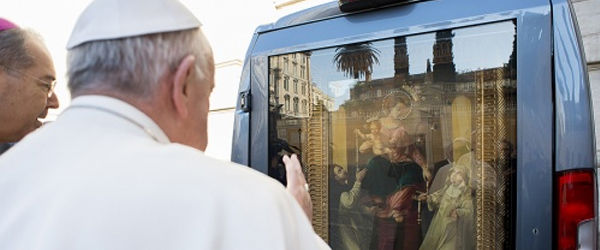Mary’s face was the first face that Jesus saw when he came into this world. Her voice was the first voice he heard. She was with him also at the end of his life. He was looking at her in the moments before he gave up his life for us on the cross.
The last conversation that Jesus had was with Mary. And it was about us.
We all remember the scene at the foot of the cross. It is filled with sadness. Jesus sees Mary and the apostle John there. He says to his mother, “Woman, behold your son!” Then he says to St. John, “Behold your mother!”
From that moment on, the Gospel tells us, John took Mary to his own home.
Jesus was doing what any good son would do. He was making sure that his mother would be well taken care of after he was gone. So he entrusted her to his beloved disciple.
But he was also making provisions for us. His words, “Behold your mother!” are a command. They are addressed to every one who would be his disciple.
Jesus entrusted each one us to Mary. His last wish — some call it his last will and testament — was that his mother would be our mother.
As St. John did, each of us must take Mary into our “own home,” into our lives. We must have a deep personal relationship with her — one of love, affection, devotion and trust.
Jesus grew in wisdom in the household at Nazareth, with Mary and St. Joseph. We can grow in faith and holiness too if we stay close to Mary. We need to be like good children, listening to her words and learning from her example.
Mary told the angel at the Annunciation, “Let it be done to me according to your word.”
Mary entrusted herself totally to God’s will for her life. She made a conscious decision to cooperate with his will, to be a “handmaid” to his plan of salvation.
I like to think that Jesus learned something of his own attitude of trust in God’s will from Mary.
We can hear her faith reflected in the words that Jesus taught his disciples to pray: “Thy will be done.”
We can hear how deeply Jesus himself lived this attitude of abandonment to God’s will. On the night he was asked to die for us, he prayed: “Not my will, but thine be done.”
That’s the attitude we need to live as children of God and children of Mary. Like Jesus and like Mary, we need to trust that our heavenly Father knows what is best for us, that he has a plan and a purpose for our lives.
We need to say to God in every circumstance, “Not my will, but thy will be done.”
We can also learn a lot from Mary’s habit of reflecting on the life of her Son. The Gospel says she treasured his words and pondered the meaning of his actions: “She kept all these things, pondering them in her heart.”
In this, too, she can be our model. We should spend some time each day contemplating Jesus’ words and deeds through our prayerful reading of the Gospels.
Like Mary, we should keep his words and example in our hear. We should pray for the grace we need every day to love her more and to be more like Jesus.
As we pray for one another this week, let us all try to take some practical steps to deepen our devotion to Mary. Maybe that means praying the Rosary with more devotion and affection. Maybe it means saying a special Marian prayer, like the Memorare.
One practice I recommend: Start the habit of asking Mary often during the course of the day: “Show yourself to be a Mother to me!”
This prayer comes from an ancient hymn, Ave Maris Stella (“Hail Star of the Sea”). Many saints have used these words to ask for Mary’s help.
Blessed Mother Teresa of Calcutta would pray: “Mary, Mother of Jesus, be Mother to me now.”
Let us ask Mary’s intercession to help us love her as Jesus loved her. And let us dedicate ourselves to sharing our lives generously with others — as our Blessed Mother did.

